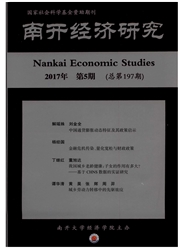

 中文摘要:
中文摘要:
金融约束对企业投资行为的影响日益受到重视,众多的研究者将其归结于信贷和资本市场内在的不完全。但是对于存在二元产权结构上市公司体系的转型经济体而言,还需考虑企业的预算软约束和较为严重的代理成本问题。文章结合宏观层面的分析,从企业异质产权结构导致的预算软约、金融约束差异和代理成本理论的分析视角,对我国上市公司投资行为的影响机制进行综合解释,并以1373家上市公司的数据为样本,采用面板数据的分析对我国上市公司的投资行为特征进行分析。文章发现两类企业在融资约束上存在显著差异,尽管金融约束对投资有着明显的影响,但是由于我国资本市场发展的特殊性,经典“投资一现金流敏感度假说”的研究范式缺少上市公司数据的支持。实证表明,我国上市公司的投资行为受预算软约束条件下的委托代理问题和金融约束因素共同影响。这对理解我国上市公司的投资行为特征提供了一种新的思路。
 英文摘要:
英文摘要:
Financial constraints due to the imperfection of capital market have been emphasized as an important factor determining investment by researchers recently. Beside of which, the soft budget constraints ( SBC ) and agency problem caused by dual property structure of enterprise system are even more important for undenstanding the beharior of investment in transitional China. Combing the background of aggregate investment, this article analyzes the investment behavior and its inner mechanism of listed company in China from different views of SBC, agency theory and financial constraints. Based on the empirical study of 1373 listed companies, we found there are indeed some differences for SOE and NSOE in the aspect of financial constraints even the hypothesis on nexus of cash flow and investment fails. Evidence has been found to support that principal-agency problem in the background of SBC and financial constraints could explain the investment behavior of listed company jointly, which provides another way to interpret the investment behavior of listed company in transitional country.
 同期刊论文项目
同期刊论文项目
 同项目期刊论文
同项目期刊论文
 期刊信息
期刊信息
